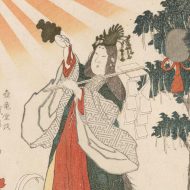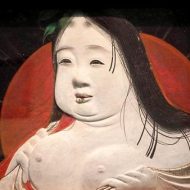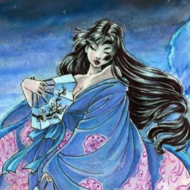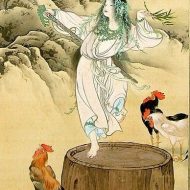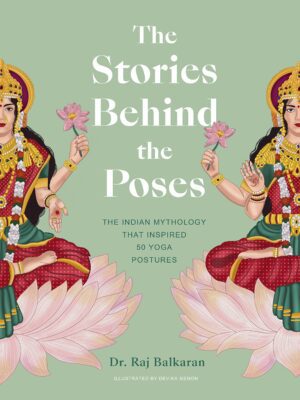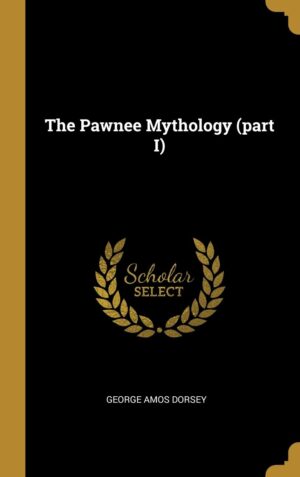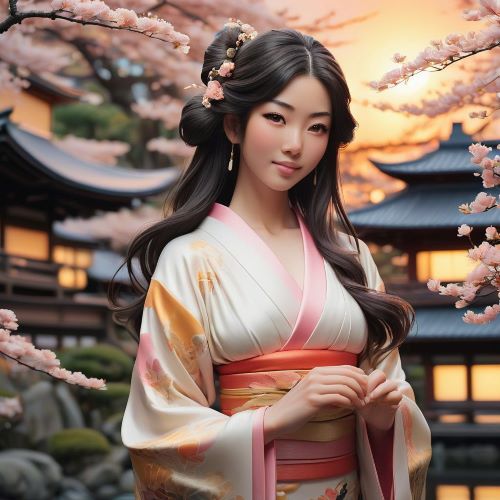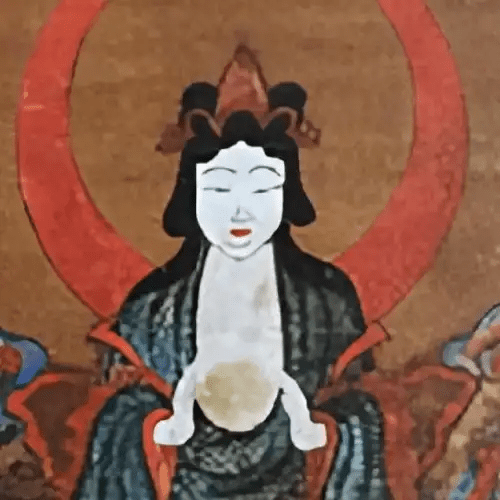Ame-no-Uzume : The Goddess of Dawn
Listen
At a glance
| Description | |
|---|---|
| Origin | Japanese Mythology |
| Classification | Gods |
| Family Members | Sarutahiko Okami (Husband) |
| Region | Japan |
| Associated With | Revelry, Dance, Dawn, Arts |
Ame No Uzume
Introduction
Ame-no-Uzume, also known as Ame-no-Uzume-no-Mikoto, is a revered deity in the Shinto religion of Japan. She embodies joy, mirth, and the arts, and her story intertwines deeply with that of Amaterasu Omikami, the sun goddess. Ame-no-Uzume’s captivating performance played a pivotal role in bringing light back to the world by enticing Amaterasu out of the cave where she had been hiding. Her name translates to “heavenly persuader,” reflecting her role in restoring light to the world. In Japanese mythology, she is celebrated as the goddess of dawn, meditation, revelry, and the arts. Ame-no-Uzume is also the wife of fellow-god Sarutahiko Okami, adding further depth to her mythological connections and significance within Shinto lore.
Physical Traits
Ame-no-Uzume is commonly depicted as a vibrant and lively deity, exuding a youthful energy that mirrors the effervescence of dawn. In various artistic representations, she is portrayed in flowing garments, her laughter embodying boundless exuberance. This celestial figure symbolizes the breaking of darkness and the arrival of light, heralding new beginnings. Depictions of Ame-no-Uzume vary, with some showcasing her as a performer adorned with theatrical makeup and others emphasizing her serene aspect, radiating an inner light associated with dawn.
Unlike the reserved and strict Amaterasu, Ame-no-Uzume is depicted as joyful and open-hearted, dedicated to spreading happiness. She is often illustrated in loose or revealing clothing, which other kami may find comical, but Ame-no-Uzume herself remains unconcerned, embodying a carefree spirit in contrast to the more reserved nature of her counterpart.
Family
Ame-no-Uzume’s marriage to Sarutahiko Okami, a deity associated with crossroads and guidance, symbolizes a harmonious balance between joyful expression and grounded wisdom within Japanese mythology. Sarutahiko Okami, revered as the leader of the kami, represents a complementary force to Ame-no-Uzume’s exuberance and vitality. Together, they are credited with the creation of various Japanese art forms, including kagura and noh theater.
In addition to her union with Sarutahiko Okami, Ame-no-Uzume’s familial connections underscore her significance. She is identified as the daughter of the sea god, Watatsumi, which highlights her divine lineage and ties to elemental forces within the natural world. This heritage mirrors the cyclical rhythms of nature, aligning with the dawn’s daily emergence from the night. Through her familial relationships and marriage, Ame-no-Uzume embodies the interconnectedness of mythological themes and artistic expression in Japanese folklore.
Other Names
Ame-no-Uzume is known by various epithets and titles that highlight different facets of her character and mythological role. One of her formal titles is Ame-no-Uzume-no-Mikoto, signifying her status as a revered deity. She is also recognized as The Great Persuader, reflecting her cunning and ability to influence others through her actions. Another title, The Heavenly Alarming Female, alludes to the unconventional methods she employed to entice Amaterasu out of hiding.
Additionally, Ame-no-Uzume is sometimes referred to as Ōmiyanome-no-Ōkami, which may connect her to the Inari kami associated with rice and agriculture. In comedic theater, she is depicted as Okame, a character known for her boisterous laugh and uninhibited enjoyment of life. These alternate names and titles provide diverse interpretations of Ame-no-Uzume’s personality and mythological significance.
Her name, Ame-no-Uzume, carries meaningful symbolism. “Ame” translates to “heaven,” while “Uzume” can mean “receiving” or “filling,” suggesting a celestial being who brings forth joy and light. This name, along with her various titles, reflects the multifaceted nature of Ame-no-Uzume’s role in Japanese mythology and culture.
Powers and Abilities
Ame-no-Uzume’s mythological prominence is rooted in her pivotal role in coaxing the Sun Goddess, Amaterasu, out of seclusion. Legend tells of how Ame-no-Uzume orchestrated a lively dance accompanied by laughter and music, successfully luring Amaterasu out of a cave and restoring light and balance to the world. This event highlights Ame-no-Uzume’s persuasive abilities and her capacity to bring renewal and vitality through joyous celebration. Beyond her persuasive prowess, Ame-no-Uzume embodies the essence of celebration and renewal. She is closely associated with festivals and rituals that honor transitions and invoke joy, symbolizing the transformative power inherent in each new day as the goddess of dawn.
Ame-no-Uzume’s influence extends to the realm of artistic expression, particularly in the creation of traditional Japanese art forms such as kagura (dance depicting stories of kami) and noh theater. She is also a figure in comedic theater like kyogen, reflecting her connection to revelry and entertainment. Revered as the goddess of revelry due to her association with various theatrical forms, Ame-no-Uzume’s mythological profile is enriched by her husband’s connections to these arts and her link with the Japanese fox spirit kitsune.
Her powers encompass a spectrum of attributes that mirror her multifaceted personality: from inspiring merriment and revelry to possessing exceptional charisma and the ability to influence through action and word as the “Great Persuader.” Legends even suggest she has the ability to alter her appearance, adding to her captivating and unpredictable nature. As a patron of the arts associated with the rising sun, Ame-no-Uzume symbolizes creativity and the promise of new beginnings, particularly in dance, music, and theatrical performance.
Ame-no-Uzume’s story, especially her dance to lure Amaterasu from the cave, serves as a powerful allegory of hope and transformation. It emphasizes the importance of joy, laughter, and creativity in overcoming adversity. Her unconventional approach underscores the value of boldness and embracing joy, even in challenging circumstances. Through her actions, Ame-no-Uzume embodies resilience and the enduring power of celebration in Japanese mythology, offering a timeless lesson on the transformative impact of mirth and inspiration in the face of darkness.
Modern Day Influence
Ame-no-Uzume’s enduring legacy resonates in contemporary culture, inspiring a wide array of artistic interpretations across different mediums. From traditional Noh theater to modern manga and anime, her image and story continue to captivate and inspire audiences. Her symbolism as a catalyst for change and the triumph of light over darkness speaks to themes of resilience and hope, offering a timeless narrative that transcends generations.
Beyond artistic expressions, Ame-no-Uzume’s archetype is celebrated in spiritual and cultural practices, particularly through festivals dedicated to her honor. These festivals signify the changing seasons and the promise of new beginnings, reflecting Japan’s deep connection to its mythological heritage. Ame-no-Uzume’s spirited essence serves as a touchstone for embracing life’s exuberance and the transformative power of embracing change.
In modern Japan, Ame-no-Uzume’s influence extends prominently into the realm of performing arts. She is revered as a protector of the arts, with many theatrical performances and dance schools seeking her blessings and inspiration. Ame-no-Uzume is credited with the creation of kagura, a form of dance that tells stories of kami, as well as contributing to comedic theater traditions like kyogen, which continue to bring joy and laughter to audiences today. Additionally, her connection to kitsune, Japanese fox spirits known for their cunning and wiles, remains a popular theme in Japanese folklore and culture.
Despite changes in religious practices over time, Ame-no-Uzume still holds significance within the Shinto pantheon. Numerous shrines dedicated to her, such as Chiyo Shrine, Tsubaki America Shrine, and Tsubaki Grand Shrine, serve as focal points for reverence and spiritual connection. The classical music and dancing used in Shintō religious ceremonies, known as kagura, are said to have originated from her legendary performance. Furthermore, Ame-no-Uzume’s presence extends into popular culture, appearing as a type of demon in various media forms, including video games like the Megami Tensei series, showcasing her enduring impact and versatility in contemporary narratives.
Related Images
Newest addition
Frequently Asked Questions
What is Uzume the goddess of?
Ame-no-Uzume, Japanese goddess, brings joy with the dawn. Laughter and merrymaking flow from her, a muse for artists and dancers. Her playful spirit, like the rising sun, chases away darkness.
Who is Ame-no-Uzume's husband?
Ame-no-Uzume’s husband is the deity Sarutahiko Okami. He is associated with crossroads and guidance.
Who is the Japanese goddess of joy?
The Japanese goddess of joy is Ame-no-Uzume. Her name translates to “heavenly receiving woman,” and she embodies joy, mirth, and revelry. She’s known for her infectious laughter and the captivating dance that lured the sun goddess Amaterasu out of hiding, bringing light back to the world.
How does Ame-no-Uzume trick Amaterasu?
World plunged in darkness, Amaterasu hides. Ame-no-Uzume, a whirlwind of joy, dances wildly. Gods erupt in laughter, a symphony of amusement. Curiosity stings Amaterasu, a peek out of the cave. Seized by the moment, light returns with the sun goddess.
What is Ame-no-Uzume the goddess of?

